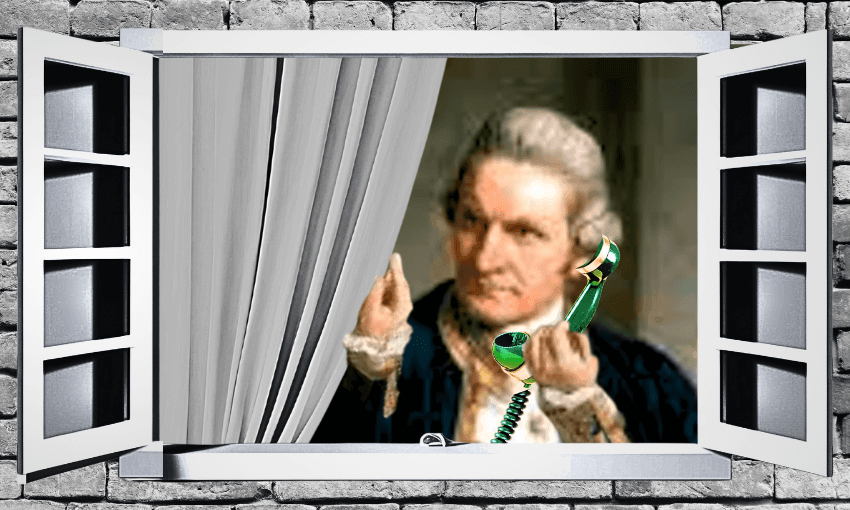An Israeli-owned cargo ship attracted protesters as it docked at the Ports of Auckland this week. Here’s why.
About 50 people waved Palestinian flags and protest placards at the corner of Tamaki Drive and Solent Street near Auckland’s waterfront yesterday afternoon. A handful had arrived by pram or papoose, and many more were tertiary students. Behind them port machinery moved and stacked containers of ships, one of them the MSC TANIA, a vessel owned and operated by ZIM Integrated Shipping Services, a publicly held Israeli company.
Members of the groups behind the protest, Action 4 Palestine and Working Students of Aotearoa, had read about the protests against ZIM ships in Sydney, and it got them thinking. It wasn’t long before they found that ZIM has schedules of all its lines on its website, so they could know when to expect their arrival in New Zealand’s ports.
Images promoting the picket were made public on Wednesday afternoon. “Come when you can,” read the invitation, encouraging people to come after work. But between 5 and 6pm, the protesters were forcibly removed by police. Some had shifted from the corner to sitting across Solent Street, blocking the entry and exit to the port. Six were arrested: five for obstruction, and one for disorderly behaviour. Underneath videos of the clash on Instagram, people have commented alleging the police were using unnecessary force. They also used pepper spray.
Their call for sanctions of Israeli goods fits into a global movement called BDS. Those three letters are echoing through rallies across the country, where they are followed by “Boycott! Divest! Sanction!” On social media collages of company logos are being shared alongside the phrase. But what does it all mean?
What’s BDS?
BDS stands for boycott, divest and sanction. It’s a call for people, companies and governments around the world to stop financially supporting Israel by boycotting their products, removing financial investments and imposing sanctions on trade. In doing so, the movement hopes to put non-violent pressure on Israel until a list of demands is met.
On the BDS website, there are just three demands: ending the Israeli occupation, recognising the Arab-Palestinian citizens of Israel as equal, and respecting the rights of Palestinian refugees to return to their homes. Events like yesterday’s picket also call for a ceasefire in Gaza.
What is being BDS-ed?
Because a complete list of companies complicit in Israel’s illegal occupation of – and now war against – Palestine would be devastatingly long, the leaders of the BDS movement are narrowing the focus to a smaller number of companies and products for consumers to boycott.
In Aotearoa, they’re pointing to Israeli-owned brands SodaStream, Axa (insurance), Puma, Siemens (technology), Ahava (beauty products), and HP (printers and stuff), as well as companies supporting Israel like McDonald’s, Domino’s Pizza, and Burger King, for franchises giving free food to the Israeli army, Pizza Hut because it is owned by Yum Brands which supports Israeli startups, Starbucks for suing its union after they expressed solidarity with Palestinians on X, and Disney+ for donating millions of dollars to “humanitarian efforts” in Israel. It’s safe to say many activists will be eating healthy and going without Baby Yoda.
Stickers have been appearing on products like Obela hummus and Dove soap in supermarket aisles, quietly stuck on by activists who know that many people won’t be reading the small print on their groceries.
In addition, people are looking into where their investments, like KiwiSaver, are going. This can be a tricky and convoluted process, so online tools like Mindful Money are being used to check funds and divest accordingly.
The final letter, S for sanctions, requires government action. Actions like yesterday’s picket aim to put pressure on the government to act, as well as to inform the average person who can B and D.
Where did the BDS movement come from?
According to the website, BDS was launched in 2005 by 170 Palestinian unions, refugee networks, women’s organisations, professional associations, popular resistance committees and other Palestinian civil society bodies.
It was inspired by the South African anti-apartheid movement which grew out of the boycott movement, and was enacted by localised groups across the world. Consumer boycotting was a constant element in the fight against apartheid from outside of South Africa, as were campaigns against the investments of international banks and companies in South Africa. The movement aimed to isolate South Africa by lobbying for exclusion from sporting and cultural events, and ending military and diplomatic links. People sometimes partly attribute the end of apartheid in South Africa to the external pressure this caused.
In New Zealand, that movement came to a head during the 1981 Springbok tour. Though it divided the country at the time, most of us now look back on the pitch invasions, flour bombs, patu and shields with pride. The protests have become part of our national identity as people who stand up for human rights.
Arguments against BDS
Some worry that BDS will impact all Israelis, regardless of whether they themselves agree with the state’s actions. This is why excluding Israeli cultural and academic figures has mostly been avoided. There have also been allegations of antisemitism.
Others say that the current focus should urgently be on calling for a ceasefire rather than trying to impact Israel’s economy.
Does BDS work?
There have been some high-profile companies like Ben & Jerry’s that have stopped selling their products in the occupied territories, and others that have changed their production operations, like SodaStream moving its West Bank factory in 2014. Still, the Israeli economy chugged on and so did the occupation. In 2018 Israelis were deprived of a Lorde performance following a public campaign against the concert.
The impact the BDS movement could have on Israel’s economy and actions is contested. But it is at least something that people who live on small isles on the other side of the world from the conflict can do.



